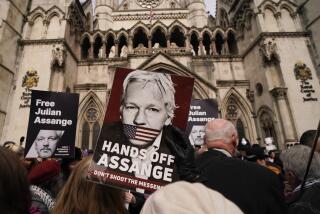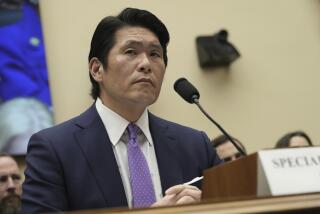Pfc. Bradley Manning’s WikiLeaks trial also a test for government
WASHINGTON — Army Pfc. Bradley Manning has already confessed to mishandling classified information for sending hundreds of thousands of U.S. intelligence documents to the WikiLeaks website, including reports of airstrikes that killed civilians, assessments of terrorism suspect captives, and diplomatic cables. On those charges alone, he could spend 20 years in prison.
But on Monday, the 25-year-old Army computer whiz who lost his faith in the government over the U.S. wars in Iraq and Afghanistan will go on trial on charges of aiding the enemy and putting American lives at risk, and for that he is facing a possible life sentence. His general court-martial at Ft. Meade, Md., will place the enlistee in wire-rim glasses against the might of the U.S. government.
But in many ways, the government also will be tested in this military trial, expected to last most of the summer.
The trial could prove a further embarrassment to a government that granted a low-level disgruntled Army private from a small farm in Oklahoma wide access to the nation’s top-secret vault and then unwittingly allowed him to compromise an estimated 700,000 state secrets.
“It’s disappointing on a diplomatic level,” said Donald J. Guter, president of the South Texas College of Law and a former Navy judge advocate general. “And the lack of any efficient control over the content of the material was a huge issue. He shouldn’t have been able to do what he did. It’s disturbing and embarrassing.”
Legal experts say that government lawyers do not have an open-and-shut case because they must prove that Manning knew he was jeopardizing national security.
“The government can’t win just by showing up,” said Elizabeth Goitein, an expert on government secrecy and co-director of the Brennan Center for Justice at the New York University School of Law. “It has to prove that Manning had reason to believe his disclosures would harm national security.”
While most eyes have focused on Manning and his effort to avoid a life sentence, another kind of drama has played out beyond the small military courtroom.
Just outside Ft. Meade, about 2,000 protesters descended in support of Manning on Saturday, disembarking from 12 buses from New York, Philadelphia and Connecticut. Among the speakers was Daniel Ellsberg, the Pentagon Papers whistle-blower from an earlier era.
The Bradley Manning Support Network, which organized the protest, says it has raised more than $1 million on his behalf.
Julian Assange, editor in chief of WikiLeaks, has seized the glory of Manning’s scoops while Manning has languished for three years in a military brig.
But Assange remains in a prison of his own. He has been holed up inside Ecuador’s tiny embassy in London, claiming diplomatic asylum. Sweden has sought his extradition for questioning in a sexual assault case.
U.S. prosecutors presented evidence in the pretrial phase of the Manning case suggesting a broader Manning-Assange conspiracy to steal the material for publication, and U.S. officials have weighed an attempt to bring Assange to this country on charges related to Manning.
The trial will start with opening statements from the lawyers, and then the government’s case will be presented. But much of the prosecution will be held in closed session, away from the public, with testimony from two dozen government witnesses detailing classified information.
The military’s new pursuit of Manning, the 5-foot-2 son of a Navy intelligence analyst, involves 21 charges, including one count of “aiding the enemy.” The judge in the 12-week nonjury trial is Army Col. Denise Lind.
Among the secret material that WikiLeaks obtained from Manning and posted on its site were combat videos of civilians being killed in U.S. airstrikes, detailed logs of U.S. military patrols, and government assessments of terrorism suspects held at the U.S. naval base at Guantanamo Bay, Cuba. The release of so much material, especially unflattering diplomatic dispatches that humiliated U.S. allies abroad, incensed U.S. officials.
How damaging the material was overall remains to be seen. Prosecutors expect to provide a detailed assessment at Manning’s sentencing.
In February, Manning read a 35-page handwritten statement confessing to the lesser charges but also highlighting some of his reasoning for leaking the secrets. He recalled making his decision to go public with the documents while he was homebound in his aunt’s house during a Washington, D.C., blizzard.
After two East Coast newspapers did not respond to his queries, he turned to WikiLeaks.
“I began to become depressed with the situation that we found ourselves increasingly mired in year after year” in Iraq and Afghanistan, he said. “I felt that we were risking so much for people that seemed unwilling to cooperate with us, leading to frustration and anger on both sides.”
He left open the crucial question: whether he knew he was harming U.S. interests and aiding the enemy.
That question, and whether Manning gets life in prison, will be answered at trial.
More to Read
Start your day right
Sign up for Essential California for news, features and recommendations from the L.A. Times and beyond in your inbox six days a week.
You may occasionally receive promotional content from the Los Angeles Times.







